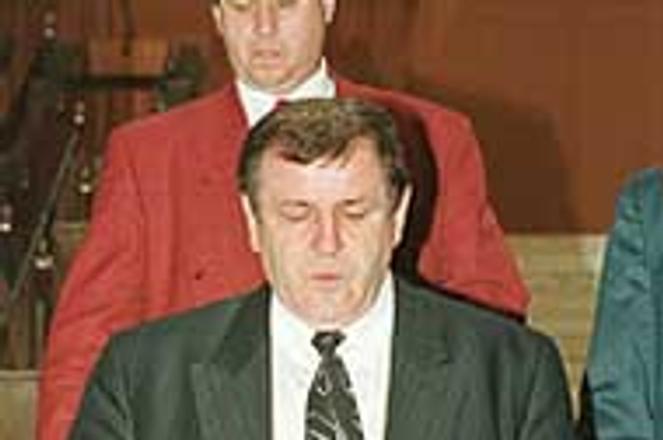Could it happen again? Then-Prime Minister Vladimír Mečiar leaves parliament in March 1994 after his government lost a confidence vote.photo: TASR
When the opposition HZDS party in January first proposed holding a referendum on early elections, the parties of the governing coalition treated it as something of a joke, and said they would never agree to early elections even if citizens demanded them. But with the publication last week of a poll giving the government less than 40% popular support, and the admission of at least one coalition party that it would respect the results of any referendum, the phrase 'early elections' suddenly gained credibility.
For the moment, the referendum process is on hold while President Rudolf Schuster waits for legal experts to tell him whether the referendum question is phrased correctly (Schuster left on February 15 for the Vatican, and thus was unable to keep his promise to HZDS leader Vladimír Mečiar to have an answer by mid-month). Once Schuster renders a verdict, the HZDS will launch a petition drive to collect the 350,000 signatures needed to have a referendum called.
Even were the petition successful, according to political scientist Ľuboš Kubín, it is "very unlikely" that the referendum would attract the participation of 50% of registered voters - the number required for the results of the plebiscite to be valid. And even if the referendum were valid, early elections could not be called unless 90 members of parliament out of 150 approved the move - hard to imagine with the government controlling 92 seats in the chamber.
But these calculations no longer comfort the parties of the ruling coalition. A poll released by the Markant agency on February 8 gave the government 39.8% support, down from almost 60% in September 1998 national elections. What is more, the left-leaning SDĽ and SOP parties received 5.3% and 4.4% support, respectively, meaning that if elections were held now they might not win the 5% support necessary to secure seats in parliament.
It was against this background of voter abandonment that SDĽ caucus chief Ladislav Orosz said his party would respect the results of any referendum. "If the referendum were really successful, our tendency is to respect the will of the voters," he said. Jiri Malchárek, an MP with the SOP party, also said he would not defy the popular will.
Kubín explained that the SDĽ and SOP, as parties committed to defending the rights of ordinary Slovaks, could ill-afford to defy the popular will, even if it meant their own elimination from parliamentary politics. One of Mečiar's central aims in promoting the referendum, he hypothesized, had been to ensnare the government in just such a dilemma - either agreeing to an event which might remove it from power, or be seen to be standing against the will of the people.
For the moment, most government members are taking the line that the referendum will not attract the necessary participation, and that the threat of 'early elections' will simply evaporate. "Even if the referendum took place, it wouldn't be successful because we would be able to explain to our voters that it's wrong to cut short the mandates of our MP's after two years in office, especially when they still have the most difficult and unpopular measures to approve, measures that will lead to a general improvement," said Orosz.
Béla Bugár, leader of the governing Hungarian Coalition Party, refused to even consider the possibility that voters might ask the government to resign. "Mečiar's referendum can't succeed," he said. "One and a half years ago, citizens rejected the style of politics practiced by Mr. Mečiar and his government."
Other government MP's have been more bold, saying they would simply refuse to approve early elections even if they were demanded by the electorate. "I'm going to vote against a shortened term in office," said František Mikloško, a member of the Christian Democrats faction. "I realise I will eventually have to explain my reasons to voters, but I believe my arguments will be strong enough."
Whatever the outcome of any referendum on early elections, the episode has hurt the government's image and allowed the opposition to assume the role of dictating the nation's political agenda, according to Kubín. The credibility of the petition drive has also been bolstered by the recent Markant poll, which gave the HZDS 32.2% support and at least a chance of forming a hypothetical post-election government with the nationalist SNS party (7.2%) and the newly-formed Smer party (14.3%).
Mindful of the building momentum behind the referendum, the government recently appealed to voters not to support or vote in any plebiscite. "It's not citizens who want early elections, but the HZDS," said Dzurinda after a coalition meeting on February 8.
But Ján Cuper, a legal expert with the HZDS, said the appeal showed the cabinet was running scared. "We'll have no problem collecting 350,000 signatures on the petition, in getting enough voters to take part in the referendum, or in convincing more than a million people [a majority of participants] to agree to early elections," he said.


